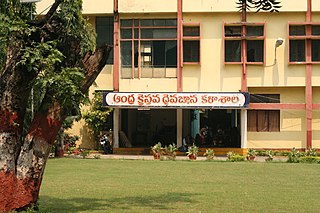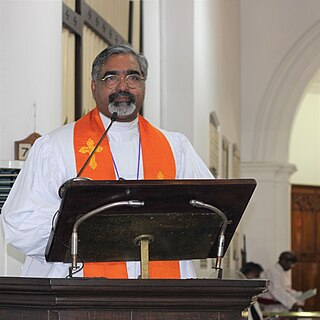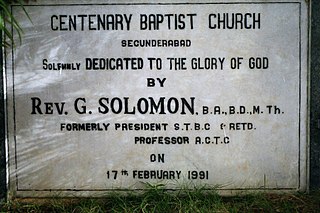
Andhra Christian Theological College (ACTC) is a seminary in Telangana which was founded in 1964. It is affiliated with India's first university, the Senate of Serampore College (University), and has degree-granting authority under a Danish charter ratified by the government of West Bengal. ACTC is on the Hussain Sagar canal (north) in Gandhinagar, Hyderabad, about 4 kilometres (2.5 mi) from the Secunderabad Junction railway station.

Baptist Theological Seminary is a Baptist seminary located in Jagannaickpur, Church Square, Kakinada in Andhra Pradesh, India. It is affiliated with the Convention of Baptist Churches of Northern Circars.

Andhra Evangelical Lutheran Church (AELC) was constituted in the year 1927 in Andhra Pradesh, India. It is the Indian successor to the United Lutheran Church in America which was started as a self-supporting, self-governing, and self-propagating church among Telugu Christians.
M. Victor Paul was a biblical scholar who served as President of the Andhra Evangelical Lutheran Church from 1993 to 1997.
K. Devasahayam was President of the Andhra Evangelical Lutheran Church from 1965 to 1969.
Bishop T. B. D. Prakasa Rao was the fourth CSI-Bishop - in - Krishna-Godavari of the Protestant Church of South India who occupied the Cathedra placed at CSI-St. Paul's Cathedral, Vijayawada. The Bishopric of Prakasa Rao lasted for two decades from 1981 through 2001, one of the longest in the history of the Church of South India Society. Prakasa Rao led the bishopric of Krishna-Godavari that comprised the Christian missions established by the London Missionary Society (LMS) and the Church Missionary Society (CMS) which merged its South India Christian missions in India into the Church of South India Society which was inaugurated in 1947 at the CSI-St. George's Cathedral, Madras.
Acharya A. B. Masilamani or Abel Boanerges Masilamani (1914–1990) was a Golden Jubilee Baptist pastor and evangelist on whom parallels had been drawn comparing his ecclesiastical ministry with that of Saint Paul. The Mar Thoma Syrian Church, one of the Saint Thomas Christian Churches founded by Thomas the Apostle in the first century which holds the annual Maramon Conventions used to have Masilamani preach at its conventions since the 1970s. During one such Maramon Convention held in 1983 at Maramon, Masilamani was one of the main speaker who spoke on Christology in the presence of the two patriarchs of the Mar Thoma Church, Alexander Mar Thoma and Thomas Mar Athanius.
E. Prakasam, a Lutheran, was the first Indian President of the Protestant Andhra Evangelical Lutheran Church Society whose ministry was primarily based in the Guntur District and also in East Godavari District, West Godavari District, Krishna District, and Visakhapatnam District. Being one of the established Indian Pastors, Prakasam was elected as president and served from 1944 to 1950 after which he resumed his Pastoral duties as a Lutheran Pastor.
K. Frederick Paradesi Babu is the current President of the Protestant Andhra Evangelical Lutheran Church Society. He had his ministerial formation at the Andhra Christian Theological College, Hyderabad, a Seminary affiliated to the nation's first university, the Senate of Serampore College (University).
Ch. Victor Moses is President Emeritus of the Protestant Andhra Evangelical Lutheran Church Society headquartered in Guntur. Victor Moses is an Old Testament Scholar and a member of the Society for Biblical Studies, India, an august body of learning having members well versed in Hebrew and Greek languages hailing from the Protestant, Catholic, Orthodox and Pentecostal traditions.

Ravela Joseph was a Sapphire jubilee-Priest involved in Spiritual formation from the mid-1960s into the early 2000s in the Telugu states. He taught Systematic theology in Major Seminaries affiliated to the Senate of Serampore College (University), the nation's first modern University {a University under Section 2 (f) of the University Grants Commission Act, 1956} with degree-granting authority validated by a Danish Charter and ratified by the Government of West Bengal.

Suppogu Joseph is a Golden jubilee Pastor of the Protestant Samavesam of Telugu Baptist Churches with major contribution to New Testament scholarship with reference to Lukan literature. In a study on Luke in 2010 by Justin Alexandru undertaken at the University of Durham, Joseph's work has been cited by the researcher in the context of Authorship of Luke–Acts where Justin authoritatively attests the work of Joseph.
Rayi Ratna Sundara Rao was a prolific writer, theologian and comparative religion scholar who once was the principal of the Gurukul Lutheran Theological College, Chennai, affiliated to India's first university, the Senate of Serampore College (University).
S. E. Krupa Rao was a Baptist Pastor of the Convention of Baptist Churches of Northern Circars where he held leadership positions in the Church society whose area of operation extended from Srikakulam District in the northern circars along the Bay of Bengal right through seven districts up to Guntur District.
G. D. V. Prasad is an Old Testament scholar and translator who was the Director of Translations at the Bible Society of India, Bangalore, from 1991 to 2010. Prasad is from the Diocese of Krishna-Godavari of the Church of South India.

A. C. Solomon Raj is the seventh successor of Frank Whittaker and eighth Bishop in Medak of the Protestant Church of South India Society and shepherds the Diocese from the Cathedra of the Bishop housed in the CSI-Medak Cathedral in Medak Town, Telangana, India. On 12 October 2016, the Church of South India Synod headquartered in Chennai, appointed Solomon Raj to assume the ecclesiastical Office of the Bishopric of Medak and was consecrated the next day on 13 October 2016 at the CSI-St. George's Cathedral, Chennai, ending four years of sede vacante in the Diocese of Medak which was without a bishop during the intervening period of 2012–2016.

G. Solomon was an Old Testament Scholar and a Baptist Patriarch hailing from the Protestant Samavesam of Telugu Baptist Churches Society (an affiliate member of the Baptist World Alliance and the National Council of Churches in India) and led it as its President during the years 1978-1982 overseeing the spiritual affairs of the Church Society whose ecclesiastical jurisdiction comprises the three states of Tamil Nadu, Andhra Pradesh and Telangana with 873 Churches comprising nearly a million members per present statistics.
Mennonite Brethren Centenary Bible College (MBCBC), founded in 1920, is a Mennonite Bible College in Shamshabad and is affiliated with the Conference of the Mennonite Brethren Churches in India and the nation's first University, the Senate of Serampore College (University)with degree-granting authority validated by a Danish charter and ratified by the Government of West Bengal.
M. S. G. Lalitha Kumari a.k.a. Lalitha Krupa Rao was the eighth Principal of Eva Rose York Bible Training and Technical School for Women, Tuni. She held the term from 1993 through 2011. Lalitha was a theologically trained woman who also used to pastor a Church. With her ordination in 1992, she became the first Woman priest in the Protestant Convention of Baptist Churches of Northern Circars.

G. D. Melanchthon (1934–1994) was a Silver Jubilee Priest hailing from Protestant Andhra Evangelical Lutheran Church Society who taught Religions, at United Theological College, Bangalore from 1968 until the latter half of the 1980s, with his career being brought to an abrupt end in 1988 when he was stricken with paralysis. Melanchthon used to be quite active among the academic community along with Chrysostom Arangaden, Arvind P. Nirmal and others in not only delivering scholarly talks, but also in contributing research articles and reviewing new titles.







